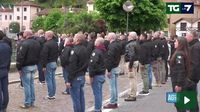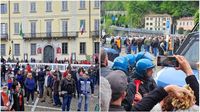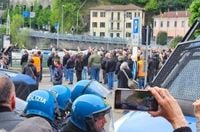On April 27, 2025, the picturesque town of Dongo, located on the shores of Lake Como, witnessed a stark and controversial commemoration. Approximately 100 neofascists gathered to pay tribute to Benito Mussolini and 15 fascist hierarchs captured and executed by partisans on April 28, 1945, as they attempted to flee to Switzerland. This annual event, organized by the cultural association "Mario Nicollini," has become a flashpoint for tensions between far-right groups and antifascist activists in Italy.
The gathering began at the lakefront in Dongo, where participants hung red roses and performed Roman salutes, chanting "Presente" in honor of Mussolini. The event, steeped in historical significance, was marked by a ritual that included the hanging of flowers on the parapet overlooking the lake, a site steeped in the memory of Italy's turbulent past. Following this, the group moved to Giulino di Mezzegra, the site where Mussolini and his mistress, Claretta Petacci, were executed by partisans led by Walter Audisio.
As the neofascists conducted their ceremony, a counter-demonstration organized by the ANPI (Associazione Nazionale Partigiani d'Italia) took place in nearby Piazza Giulio Paracchini. Several hundred antifascists gathered to protest the neofascist event, chanting the iconic Italian partisan song "Bella Ciao" and shouting slogans such as "Ora e sempre resistenza" (Now and always resistance). This show of solidarity among antifascists was a clear response to what many see as a provocative celebration of a dark chapter in Italy's history.
Primo Minelli, president of ANPI Milano, emphasized the seriousness of the situation, stating, "This is not folklore, and it should never be underestimated. They know they have political cover that tolerates their actions, which is the most condemnable aspect of this event." He further condemned the gathering as a disgraceful act in a country that has suffered under fascism, calling for a moral and political rebellion against such displays.
Silvia Roggiani, a member of parliament and secretary of the Lombard Democratic Party, echoed these sentiments, declaring the neofascist tribute as "unacceptable" and a severe wound to Italy's democratic memory. "Eighty years after liberation, to see neofascists paying homage to the hierarchs of the dictatorship is a grave insult to our values of freedom, justice, and equality," she stated. Roggiani affirmed her support for ANPI and the citizens who courageously protested against the neofascist gathering.
The event in Dongo is part of a broader trend observed across Italy, where far-right groups have increasingly sought to reclaim historical narratives surrounding fascism. This phenomenon has raised alarms among various political factions and civil society groups who argue that such commemorations undermine the principles established through the Resistance.
In Dongo, the neofascists' activities were closely monitored by police, who set up barriers to separate the two groups. Despite the heavy police presence, tensions remained high, with both sides vocal in their beliefs. The antifascist protestors, many of whom held banners and flags, expressed their commitment to preserving the memory of the Resistance while denouncing the far-right's attempts to rewrite history.
Interestingly, similar commemorations were also taking place in Predappio, Mussolini's birthplace, where relatives of the former dictator participated in a gathering that marked the 80th anniversary of his capture and execution. However, this event reportedly lacked the overt fascist salutes seen in Dongo.
As Italy grapples with its past, the events in Dongo serve as a reminder of the ongoing struggles over national identity and memory. The stark contrast between the neofascist gathering and the antifascist response highlights the deep divisions within Italian society regarding the legacy of fascism.
In the wake of these events, calls for accountability have emerged. Chiara Braga, the Democratic group leader in the Chamber of Deputies, has demanded that Interior Minister Matteo Piantedosi provide clarity on how such a controversial event was authorized. She plans to submit an urgent question to the minister, seeking answers on the permissions granted for the neofascist gathering.
The juxtaposition of the two events in Dongo and Giulino di Mezzegra reflects a broader societal struggle as Italy continues to confront its fascist past. While neofascists seek to honor figures of a regime long condemned, antifascists strive to preserve the memory of those who fought against oppression. This ongoing battle over memory and identity will likely continue to shape Italy's political landscape for years to come.
As the country marks this significant anniversary, the events in Dongo serve as a poignant reminder of the importance of remembering history accurately and the need for vigilance against the resurgence of extremist ideologies.



